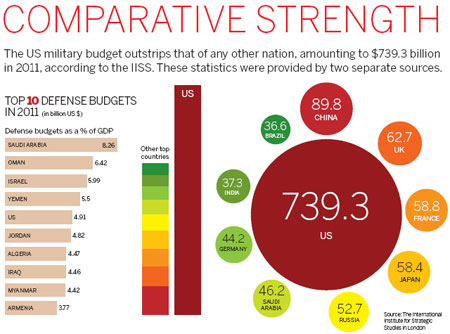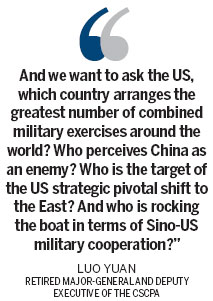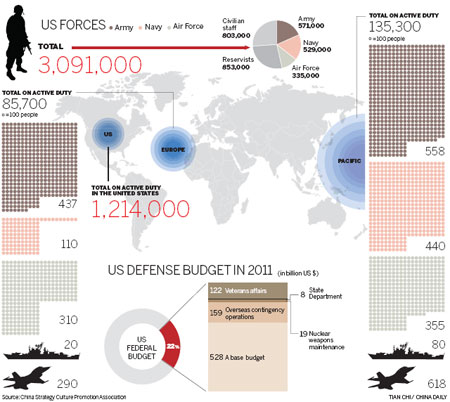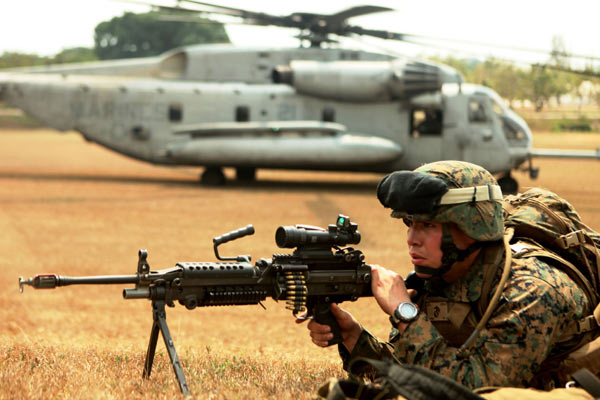Report fires back at military coverage
Updated: 2012-06-06 07:23
By Li Xiaokun (China Daily)
|
||||||||
Think tank puts US and Japanese armed forces under observation, Li Xiaokun reports in Beijing.
Which country has the largest and best-equipped military? Which country has the most nuclear weapons and the world's biggest military budget? And which country is involved in the most wars at present?
|
 |
Those were the questions posed by a think tank, the China Strategy Culture Promotion Association, in a report assessing the power of the US military in 2011. The report, published in tandem with an assessment of the capabilities of the Japan Self Defense Force, was the first on the topic to be published by a non-governmental body in China.
"The US and Japan have often used their military policy documents to criticize and exaggerate China's military development," said Luo Yuan, a retired major general and deputy executive of the association, at a news conference held on Tuesday to launch the report.
|
 |
"Although Chinese Foreign Ministry and Defense Ministry spokespeople have repeatedly refuted the documents, the US and Japan have persisted. To ensure a correct understanding of the facts, our association will this year begin publishing civil reports on US and Japanese military power," said Luo, an influential figure in Chinese military studies.
The authors of the reports insisted that they were not aimed at fomenting hawkish emotions inside China, but an attempt to remind all three sides of their wide-ranging mutual interests and help them face future challenges together.
"Our aim is to let US and Japanese officials and people understand how much China knows about their military strength and how the Chinese view their military development and strategies. Let them be the judge of whether it is objective," said Fu Liqun, a retired general and one of the authors of the report. "We don't claim to express the views of all the Chinese people, but we are confident that we reflect the opinions of many of them," he said.
Distrust and containment
According to the report, distrust and containment are two of the key words in Washington's military strategy toward China, as reflected in a paper entitled the National Military Strategy (of the United States), issued by the chairman of the US Joint Chiefs of Staff in February 2011, which defined the country's military strategy.
|
 |
Ahead of his visit to Asia this month, the US Defense Secretary Leon Panetta said that his trip to Vietnam, Singapore and India was aimed at promoting a "vigilant" response to China's growing military power. "China's military is growing and modernizing. We must be vigilant. We must be strong. We must be prepared to confront any challenge," said Panetta, addressing graduates of the US Naval Academy in Annapolis, Maryland.
A US combat theory called AirSea Battle, launched in 2009 and aimed at combining the naval and air response to hostile military action specifically targets China, according to CSCPA report. "The theory works on the premise that the Chinese military has become a new and serious challenge to the US forces. It believes that the Chinese armed forces have long been trying to establish an exclusion zone along the so-called Second Island Chain, a strategic group of islands extending from Japan to Indonesia, and that if the US does not take action now it will always hold an inferior position strategically in the western Pacific region," said Luo.
The report also claimed that among the several hundred military exercises the US undertakes around the globe every year, a series arranged in the waters to the north, east and south of China were aimed at "putting pressure on China and containing its rapid rise".
"We should pay special attention to its military exercises in east Asia and the western Pacific in association with Japan, South Korea and the Philippines," said the report.
"And we want to ask the US, which country arranges the greatest number of combined military exercises around the world? Who perceives China as an enemy? Who is the target of the US' strategic pivotal shift to the East? And who is rocking the boat in terms of Sino-US military cooperation?" said Luo.
According to the CSCPA report, the US military is more than 3 million strong, the biggest on the planet. By contrast, Chinese military personnel number 2.3 million. It also notes that the US holds the greatest number of nuclear weapons, with 1,790 warheads.
However, the report also said that US National Military Strategy has stressed the importance of military ties with Beijing: "We note that the US also expects to deepen military exchanges with China to lessen misunderstandings and avoid errors of judgment. It also wants to strengthen cooperation with China on a number of issues, including nuclear nonproliferation and the fight against piracy."
The report urged the Chinese authorities to remain alert to the US strategic pivotal shift, and other moves such as providing backing for countries involved in territorial disputes in the South China Sea, but also to examine Beijing's reciprocal interests with the US, in the field of economics, world peace and prosperity.
"For the US to regain China's trust, it has to stop moves such as military exercises that focus on China and arms sales to Taiwan," said Luo.
|
 |
Feedback sought
The report was not influenced by the Chinese government or military establishment and all the information cited came from the websites of the US and Japanese defense ministries, according to Luo.
Despite being a former deputy head of the department of global military studies at the Academy of Military Science, Luo said that his role in the report was that of a scholar working in collaboration with prominent Chinese experts on the US, Japan and military studies. "We are doing our best to objectively introduce the thoughts, power and implementation of the US and Japanese militaries," he said. "I'm not concerned about criticism that we are exaggerating the threat. We are simply telling the truth."
Launched in January 2011, the CSCPA hopes that the conclusions drawn in the two reports will be disseminated through the media and at international conferences and exchanges to prompt feedback from research fellows overseas.
Chinese authorities have yet to comment on the reports, but a government source, who asked not to be named, said they do not necessarily reflect the attitude of the authorities in Beijing.
Jin Canrong, deputy dean of the School of International Studies at Renmin University of China, said he was pleased to see the reports being published, and that they will "have a relatively low negative impact politically, compared with official documents".
"These reports have a special significance for civil think tanks in China," said Yu Lian, deputy head of the CSCPA, "To survive and develop, these organizations have to be fair and objective. We hope that a great many people around the world will hear our voice."
Military overview
In addition to assessing the Pentagon's strategy with regard to China, the report also provided an overview of the US military, ranging from armaments to troop deployment. "Our assessment of US military might in the past two years showed that although the wars in Afghanistan and Iraq, plus the financial crisis, have put the comprehensive strength of the US under severe pressure, so far their impact on US military capability has been impossible to gauge," it said.
"The US military is still the strongest in the world, capable of handling two relatively large-scale regional wars and some small-scale contingency operations at the same time," continued the report, adding, "It (the military) can also provide strong support for the US' strategic pivot shift to the East."
As for the strategic weapons reductions treaty between Washington and Moscow, which will see the US reduce the number of nuclear warheads it deploys to fewer than 1,550 in the next decade, the report said it "will not seriously hamper the nuclear deterrent capability of the US military".
On the contrary, the authors believed that the US military and conservative forces are against the idea of a "nuclear-free world", and concluded "it is doubtful that the US government will really implement the proposal".
Tough stance
Meanwhile, the CSCPA report on Japanese military might said Tokyo has taken a number of steps that have provoked disputes with Beijing, including shifting its military focus to its southwestern islands and areas such as the Diaoyu Islands, which belong to China but are the subject of territorial claims by the Japanese.
The JSDF has also "closely followed, watched and even disturbed" Chinese naval vessels engaged in training exercises in the waters near Okinawa and have taken a "tougher and tougher stance" on the Diaoyu Islands issue, according to the report.
In addition, Japan has excluded China and Russia from its multilateral security cooperation system, a grouping of countries that includes the US, South Korea, Australia, India and some Southeast-Asian nations, it said.
The report noted remarks made by the Japanese Prime Minister Yoshihiko Noda in October 2011 that Pyongyang and Beijing have added to the "opaqueness of Japan's security environment" and his statement that "although it is peaceful at present, dangers will come if we forget about war".
"Who is the target of this 'war'?" asked Luo. "That attitude has exerted pressure on the regional security environment and has cast a shadow over Sino-Japan relations."
Talking about other aspects of the JSDF, the report concluded that it is a well-trained medium-scale military with abundant budgetary resources and advanced technologies, which are being employed at a "critical time in its military transformation".
Honesty is paramount
Fu Liqun, member of the research group of the CSCPA report, said honesty is the first step in resolving the mutual distrust between Beijing and Washington, and Tokyo. "We have to tell the truth. Take the US for example, it is a country that is used to getting its own way, and China should not always remain silent about important issues."
It is the same in trade disputes, he said, adding that Washington "always talks about its unemployment rate, but rarely takes the livelihoods of the 1.3 billion people in China into consideration".
"That is a big problem for the whole world," he said. "The ideal pattern is that I leave space for you, and you also leave space for me."
Moreover, the Pentagon also needs to reflect on its "outdated" concept of security, said Fu. "It (the US) believes that only the strong survive, not in mutually beneficial results. It is basically what we call a 'zero-sum game' nowadays."
If Washington maintains that attitude towards Beijing, it will always feel threatened by a rapidly growing China and will squander many opportunities for cooperation, he said. "Healthy ties between Beijing and the US should comprise normal competitive relations, where both sides are satisfied with the results."
Fu believed that Washington needs to make the first steps to achieving that aim because "a strong country always takes a leading role in promoting bilateral mutual trust".
Wang Zijian contributed to this story.
Contact the reporter at lixiaokun@chinadaily.com.cn

 Relief reaches isolated village
Relief reaches isolated village
 Rainfall poses new threats to quake-hit region
Rainfall poses new threats to quake-hit region
 Funerals begin for Boston bombing victims
Funerals begin for Boston bombing victims
 Quake takeaway from China's Air Force
Quake takeaway from China's Air Force
 Obama celebrates young inventors at science fair
Obama celebrates young inventors at science fair
 Earth Day marked around the world
Earth Day marked around the world
 Volunteer team helping students find sense of normalcy
Volunteer team helping students find sense of normalcy
 Ethnic groups quick to join rescue efforts
Ethnic groups quick to join rescue efforts
Most Viewed
Editor's Picks

|

|

|

|

|

|
Today's Top News
Health new priority for quake zone
Xi meets US top military officer
Japan's boats driven out of Diaoyu
China mulls online shopping legislation
Bird flu death toll rises to 22
Putin appoints new ambassador to China
Japanese ships blocked from Diaoyu Islands
Inspired by Guan, more Chinese pick up golf
US Weekly

|

|






